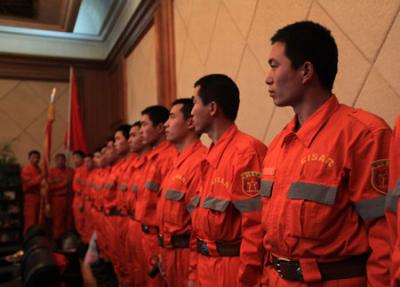Assistance does not end after the immediate emergency phase. To recover from disaster, post-disaster assistance needs to continue through the mid-to-long term recovery phase, which inevitably raises issues of governance, conflict management, and economic development, many of which are what the Chinese government regards as ‘domestic issues’. Given China’s adherence to the principles of sovereignty and non-intervention, attempts to gain ‘responsible great power’ status through in-country assistance are a slippery slope for China.
Aceh provides an important case study of China’s approach to dealing with this political challenge. Immediately after China received Indonesian government approval to despatch an international rescue team, China sent its team in three batches, each consisting of 35 people, to provide medical and emergency assistance. Once the emergency phase ended, it then focused on housing reconstruction. It built the Friendship Village of Indonesia-China (which the local population calls the ‘Jackie Chan Village’), which has an outstanding reputation in terms of housing quality and environment. Living in the village is a status symbol among local people. The approach taken by China in Aceh represented a reconciliation of disaster relief efforts with adherence to the principle of sovereignty, and led to an increase in China’s status as a ‘responsible great power’ in the eyes of local people.
Five years have passed since the tsunami. Aceh is today in a new period of reconstruction and rehabilitation. Now that housing reconstruction is basically complete, the agenda of the Aceh provincial government is economic development and employment creation. Aceh is selling the port of Sabang, which could serve as a major international alternative to Singapore’s overworked ports. In October 2009, the Governor of Aceh travelled to China and Japan to attract investment in the port. Simultaneously, Western governments and NGOs are paying special attention to reintegrating unemployed people (who were used to be called ex-combatants) to improve stability in the region.
Despite the international community’s reintegration efforts in Aceh, China has taken a traditional approach to the issue. It has concentrated its efforts mainly on housing reconstruction. Contrary to the expectations of many international organizations, China deliberately separated itself from the reintegration effort stating that reintegration is an Indonesian domestic issue and China will not intervene, despite a perception amongst international organizations that an increased involvement in dealing with fundamental regional issues like this would only improve China’s ‘responsible great power’ image.
Solutions to dealing with these problems may rest with local populations. The way local people conceptualise ‘responsible great power’ is different from how the international community does. The most pressing issue for Aceh is economic development and job creation. Aceh is selling the port of Sabang, which could serve as a major international alternative to Singapore’s overworked ports. In October 2009, the Governor of Aceh travelled to China and Japan to attract investment in the port. Many Acehnese analysts indicated in interviews with me that, if China sought a role as a responsible great power in Aceh, it could help Aceh by investing in the port to create job opportunities. While China does not contribute to the reintegration of unemployed people directly, the creation of job opportunities would nonetheless assist the reintegration effort. This would be a useful way to deal with China’s political challenge: adhering to the principle of sovereignty and advancing its own economic development, while indirectly addressing the reintegration of unemployed people through job creation, something the local population seeks. This may be the nuanced solution China needs to move forward as a ‘responsible great power’.
Miwa Hirono is a RCUK Research Fellow at the University of Nottingham.

